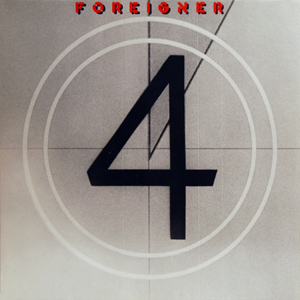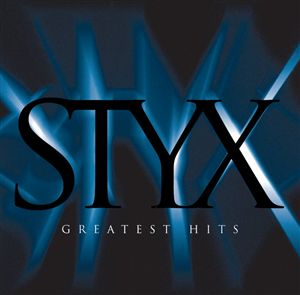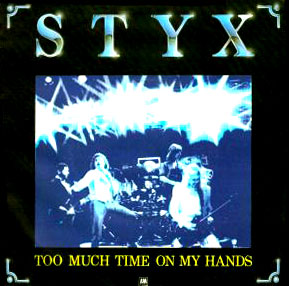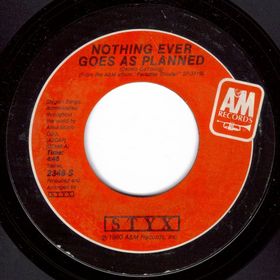Related Research Articles

The Grand Illusion is the seventh studio album by American rock band Styx. Recorded at Paragon Recording Studios in Chicago, the album was released on July 7, 1977, by A&M Records, intentionally choosing the combination 7th on 7-7-77 for luck. The release was a smash worldwide, selling three million copies in the US alone. Some estimates have the album at over 6 million copies sold. The album launched the band to stardom and spawned the hit singles "Come Sail Away" and "Fooling Yourself." The title track also received substantial FM airplay, but was never released as an official single.

4, also known as Foreigner 4, is the fourth studio album by the British-American rock band Foreigner, released on July 3, 1981 on Atlantic Records. Several singles from the album were hits, including "Urgent", "Waiting for a Girl Like You" and "Juke Box Hero".

Paradise Theatre is the tenth studio album by American rock band Styx, released on January 16, 1981, by A&M Records. It was the band's most commercially successful album, peaking at #1 for 3 weeks on the Billboard 200 in April and May 1981 (non-consecutively). It was also the band's fourth consecutive album to be certified triple-platinum by the RIAA.

Caught in the Act is a live double album by Styx, released in 1984. It contains one new song, "Music Time," which was released as a single, reaching #40 on the Billboard Hot 100 charts.

Head Games is the third studio album by the British-American rock band Foreigner, released on 11 September 1979 by Atlantic Records. Recorded at Atlantic Studios in New York, with additional recording and whole mixing taking place at Cherokee Studios in Los Angeles, it was the only Foreigner album co-produced by Roy Thomas Baker, best known for working on Queen's classic albums. It marked the first appearance of new bass guitarist Rick Wills who replaced Ed Gagliardi, and was the last album with founding members Ian McDonald and Al Greenwood, who would leave the band after the recording. Head Games is also the last Foreigner album to feature a lead vocal by guitarist Mick Jones.

"Come Sail Away" is a song by American progressive rock group Styx, written and sung by singer and songwriter Dennis DeYoung and featured on the band's seventh album The Grand Illusion (1977). Upon its release as the lead single from the album, "Come Sail Away" peaked at #8 in January 1978 on the Billboard Hot 100, and helped The Grand Illusion achieve multi-platinum sales in 1978. It is one of the biggest hits of Styx's career.

"Renegade" is a 1979 hit song recorded by the American rock band Styx on their Pieces of Eight album. Although songwriter Tommy Shaw and fellow Styx guitarist James Young usually played lead guitar on their own compositions, Shaw asked Young if he could take the solo on "Renegade". Young agreed, and Young later returned the favor by allowing Shaw to play lead on his "Half-Penny, Two-Penny" on the Paradise Theatre album. When performed live from 1978 to 1983, drummer John Panozzo increased the tempo of the drum pattern during the guitar solo sections. Also, the track would serve as the drum solo spot for Panozzo during that time frame.

"Lady" is a 1973 power ballad written and performed by the rock band Styx. It was first released on Styx II and was a local hit in the band's native Chicago, but initially failed to chart nationally. The song gained success shortly after Styx left Wooden Nickel Records to move to A&M Records in 1974 as it began picking up airplay nationwide, eventually peaking at #6 on the Billboard Hot 100 in March 1975. The power ballad was later re-recorded for the 1995 Styx compilation Greatest Hits due to a contractual dispute between A&M and Wooden Nickel.

Greatest Hits is a compilation album and primary Greatest Hits album by the American rock band Styx. It was released by A&M Records on August 22, 1995. It contains 16 tracks, 8 of which were Billboard Top 10 Pop Singles, another 4 that were Billboard Top 40 Pop Singles, and 4 that received heavy airplay on FM album oriented rock stations.

"Babe" is a song by the American rock band Styx. It was the lead single from the band's 1979 triple-platinum album Cornerstone. The song was Styx's first, and only, US number-one single, spending two weeks at No. 1 in December 1979, serving as the penultimate number-one single of the 1970s. "Babe" also went to No. 9 on the Adult Contemporary chart. It additionally held the number-one spot for six weeks on the Canadian RPM national singles chart, charting in December 1979 and becoming the opening chart-topper of the 1980s. It was also the band's only UK Top 40 hit, peaking at No. 6. It also reached No. 1 in South Africa.

"Don't Let It End" is the third track and the second top 10 single on the 1983 album Kilroy Was Here, by Styx.
"Snowblind" is a song by Styx that appears on the Paradise Theatre album released in 1981. The song is about the helplessness of cocaine addiction, alternating between slow, brooding verses and a faster, harder-edged chorus, representing the addict's cycle of highs and lows.

"Blue Collar Man (Long Nights)" is a song by American rock band Styx, released as the first single from their eighth studio album, Pieces of Eight (1978). Released in 1978, the single came in two 7" vinyl formats: one with the b-side "Superstars" (a track from The Grand Illusion) and a second single with the instrumental album track "Aku-Aku" as the b-side. Some printings of the single were also issued in a translucent blue vinyl, which are now highly sought after collectors items.

"Why Me" is a song written by Dennis DeYoung that was first released on Styx's 1979 double-platinum album Cornerstone. It was also released as the second single from the album, and reached #26 on the Billboard Hot 100 and #10 on the Canada RPM Top 100 Singles chart.

"Borrowed Time" is a song written by Dennis DeYoung and Tommy Shaw that was first released on Styx's 1979 album Cornerstone and was also released as the third single from Cornerstone. It peaked at No. 64 on the U.S. chart in April 1980.

"The Best of Times" is a song by American rock band Styx, released as the first single from their tenth album Paradise Theatre. It reached No. 1 in Canada on the RPM national singles chart, their second chart-topper in that country, and No. 3 on the US Billboard Hot 100 for four weeks in March and April 1981. In the UK, the song peaked at No. 42 on the UK Singles Chart.

"Too Much Time on My Hands" is a song by American rock band Styx, released as the second single from their tenth album Paradise Theatre. It was written and sung by Tommy Shaw, who also plays the lead guitar solo during the break in the song. It was Shaw's only top 10 single as a writer and vocalist with Styx.

"Nothing Ever Goes as Planned" is a song written by Dennis DeYoung and released by American rock band Styx on their tenth album Paradise Theatre, as well as being the 3rd single released from the album. A chart disappointment following the first two singles off the album, it peaked at No. 54 on the U.S. pop chart in late summer 1981. It also reached No. 33 on the Canada RPM Top Singles chart in the week of September 5, 1981.

One with Everything is a live album and concert video by the rock band Styx, which was recorded and professionally filmed in Cleveland, Ohio during their 2006 tour. The band played with the Contemporary Youth Orchestra, playing a set of 16 songs, including three songs from their 2005 studio album Big Bang Theory. Both an album and a DVD were released, with the Blu-ray Disc on April 29, 2009. As with many of the live releases post-Dennis DeYoung, this album does not contain any Dennis DeYoung penned or sung songs.

"Boat on the River" is a 1979 song by Styx, from their album Cornerstone. It was released as a single in 1980 in various countries, but not in the band's native United States, where "Borrowed Time" was released instead.
References
- ↑ "Great Rock Discography". p. 798.
- 1 2 Miller, Patrick (June 27, 1981). "Styx". The Bismarck Tribune. p. 5. Retrieved 2022-06-13– via newspapers.com.
- ↑ Robins, Wayne (April 24, 1981). "Styx takes it seriously". Newsday. p. II-29. Retrieved 2022-06-16– via newspapers.com.
- ↑ Rivadavia, Eduardo. "Paradise Theater". Allmusic. Retrieved 2022-06-16.
- ↑ Dome, Malcolm (February 18, 2022). "The 10 best Styx songs". Classic Rock. Louder Music. Retrieved 2022-06-19.